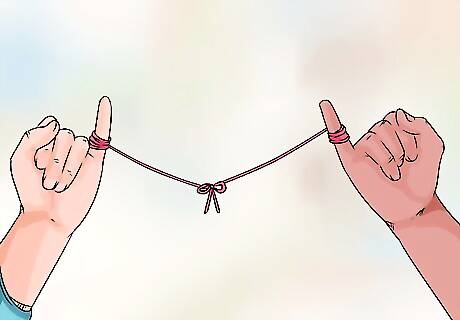
views
Examining Your Partner

Consider your partner’s personality. Is your partner similar to you in most ways, or are they the exact opposite of you? Research has found that, in long-term relationships, couples who are more similar tend to be more successful in long-term relationships. To do this, you really have to be honest with yourself. How similar are your values, goals, and beliefs? Do you enjoy doing a few of the same things? If you are in the early stages of a relationship, it may be difficult to do this honestly. If you are having trouble, consider asking a friend to help you identify the ways you are similar and the ways you are different.

Ask your partner to introduce you to friends and family. If they have already done so, then great! This is a good sign that your partner is at least open to a long-term relationship. On the other hand, if your partner hasn’t done so, and doesn’t seem open to considering the idea any time soon, then they may be hesitant to commit to a relationship. Research also suggests that the more their friends and family approve of you, the less likely it is that the relationship will end.

Think about how your partner responds to you. Do they answer promptly when you call or text? Do they make plans with you often, or are they constantly having to cancel? If your calls and texts often go unanswered, and if it seems as though they are somewhat reluctant to make plans with you, then they are probably unlikely to commit to a long-term relationship. For example, are there references to the future made (e.g. about spending Christmas together)? This is a good sign that they want you to be around in the future.

Consider your partner’s behavior. If your partner is serious about a long-term relationship with you, their behavior will change around others who would normally interest them. For example, if you are a woman dating a man and a very beautiful woman walks by, does she steal all of his attention? If so, he may still be hoping to keep his options open. That’s not to say, though, that he will never even look at another girl. Only, that if he is committed, he won’t be entranced by the sight.
Examining Yourself

Think about how you would feel if you were single. Does the thought of being alone give you anxiety? If so, then you are more likely to feel that any relationship is ideal, rather than the right relationship. You should not be willing to lower your standards to make a relationship feel right. It can be hard to be honest with yourself about something like this, but if you are searching for the right person, it doesn’t make sense to waste time with just any person.

Consider your maturity. Are you really mature enough for a long-term relationship? In a long-term relationship, you have to consider the needs and wants of someone besides yourself. If you want to be successful in that relationship, you will also sometimes have to admit that you are wrong. This can be very difficult if you are still working on your maturity.

Be happy with yourself. Have you managed to become proud of who you are, flaws and all? Many people enter into relationships hoping that the other person will “fix” them, and make them happy. Unfortunately, this is not the case, at least not in the long-term. It is not an easy task, but it is important that you learn to make yourself happy without anyone else’s help. Understand that learning how to be happy is a difficult task for nearly everyone, and it won’t happen overnight.
Considering Your Relationship

Avoid criticism. If you want your relationship to last, do your best not to criticize one another, especially when it comes to personal things. You’re not perfect, and neither is your partner. It does little good to point out all of the things they are doing wrong. Some therapists suggest that, for each negative comment or criticism you make, you should try to make at least five positive comments about your partner to help offset the negative one. Try using statements that start with "I feel" so your partner doesn't think you're blaming or criticizing them. If your partner is doing something that is bothering you, think about why it is bothering you before saying anything. For example, maybe it annoys you that your partner bites their nails, but is it really harming you?

Ask a friend what they think. If you have a friend who you trust, and who has spent a lot of time around you and your partner when you are together, then try asking them what they think. Research suggests that friends are generally better at predicting the outcome of your relationship than you will be.

Laugh together. Do you guys often spend time joking around and having fun, or are you typically quite serious around one another? Research suggests that couples who are able to joke around together feel more connected. Remember, though, that this doesn’t mean you can’t/shouldn’t be serious sometimes. Some matters require you to be serious, and you will likely frustrate your partner if they feel you aren’t taking them seriously.

Remember that you are equals in your relationship. If one of you believes that you are superior in some way (e.g. have more money, in better shape, better looking, etc.), then you are less likely to last in the long-term. It is certainly likely that you do some things better, and that your partner does some things better. Instead of using these to compete, use them to work together. For example, if you are a great cook, and your partner doesn't know how to boil water, then give them lessons. Find something that your partner does that you can't, and learn from them.

Build trust in your relationship. This is important for any long-term relationship. If something has happened to undermine your or your partner’s trust, then steps must be taken to repair the trust. This will require the person who broke the trust to hold themselves accountable, be honest, and perhaps even give up some of their privacy to prove their willingness to repair the relationship.

Make an effort. This may seem obvious, but relationships take work, and the work must be done consistently over time in order to matter. This doesn’t mean you have to have a big surprise for your partner every single day. Instead, you can do small things. For example, you can offer to cook dinner one night, or leave a note wishing them a nice day. Give them a compliment for no reason. Small things can make a big difference in a relationship.

Support one another. One of the big reasons people have relationships in the first place is because it provides a source of support. If you’re not giving this to each other, then what’s the point? This doesn’t mean you have to agree with all of the choices your partner makes, but if they are struggling with a problem or decision, be positive and supportive. Remember that they should also be doing this for you, too!
Discussing Your Relationship with Your Partner

Ask your partner to set aside some time to talk. When trying to have a serious conversation with your partner, it is a good idea to have time set aside where you won’t be interrupted by phone calls, TV shows, or other people. Thus, it is a good time to ask your partner when they have time for such a conversation. Some people feel nervous when their partner requests time for a conversation. Reassure your partner that you aren’t planning to break up with them (assuming that is the case), and that you hope the conversation will be a positive one.

Discuss your desires for a long-term relationship in general. Tell your partner what your long-term goals are when it comes to relationships.This refers to what you have dreamt of in a relationship with the right person, not with your current partner specifically. For example, whether or not you see yourself getting married, whether or not you want to have kids, what kind of home you see yourself living in (e.g. a large mansion or a small apartment in the city), whether you see yourself working or being a stay-at-home-parent. If you’re afraid that your partner might just agree with your goals in order to avoid conflict, try asking them to tell you about their long-term goals first. Be as honest as you possibly can, even if it means you disagree. If you don’t want the same things, one person shouldn’t be forced into a life they don’t want. If it turns out you don’t want the same things in the long-term, remember that this doesn’t mean you absolutely must end the relationship immediately. If your goals are still a long way off (e.g. you are both in high school or college, and have a lot of other things you want to do before settling down) and you enjoy spending time with each other, then you might wish to consider remaining in the relationship for the time being. However, it should be clear between both partners that no one is expected to change in order to remain in the relationship. Relatedly, if you have differing goals, you should not remain in the relationship because you hope that the other person will change. Although it is possible that they will, it is more likely that they won’t. In this case, you will end up wasting each other’s time, and likely end up feeling very disappointed and resentful.

Discuss your values with one another. If you plan to be in a long-term relationship, it is critical that you understand what is important to your partner. For example, is your partner very religious? Does your partner value monogamy, or do they see themselves in a polyamorous relationship in the future? Does your partner want to be lead a very social life and make lots of money someday, or do they want to live a quiet, modest life? While you don’t have to agree on every single thing, having few values in common and many that you strongly disagree about will make things very difficult. If you want a very quiet life, but your partner wants something else, it will be difficult to compromise. Remember though, that having some differences can help you and your partner grow as people.

Discuss where you see the relationship going. This can be a scary conversation to have because you may find out that your partner sees you as the flavor of the week while you thought you might get married someday. However, it is important to have a conversation about this in order to be on the same page. Try to be as honest as possible, and if it turns out they don’t want the same thing, try to be respectful. If it turns out that you don't want the same thing, try to remember that at least it is clear now, and that (should you choose to end the relationship) you can now move on to finding the person who does want a long-term relationship with you. Try not to take it too personally if it doesn’t go the way you want. Just because your partner isn’t ready for a big commitment doesn’t mean that there is something wrong with you! It simply means that they have different goals, or is in a different place in their life than you are. If it is what you want, you will find the person that is right for you.




















Comments
0 comment